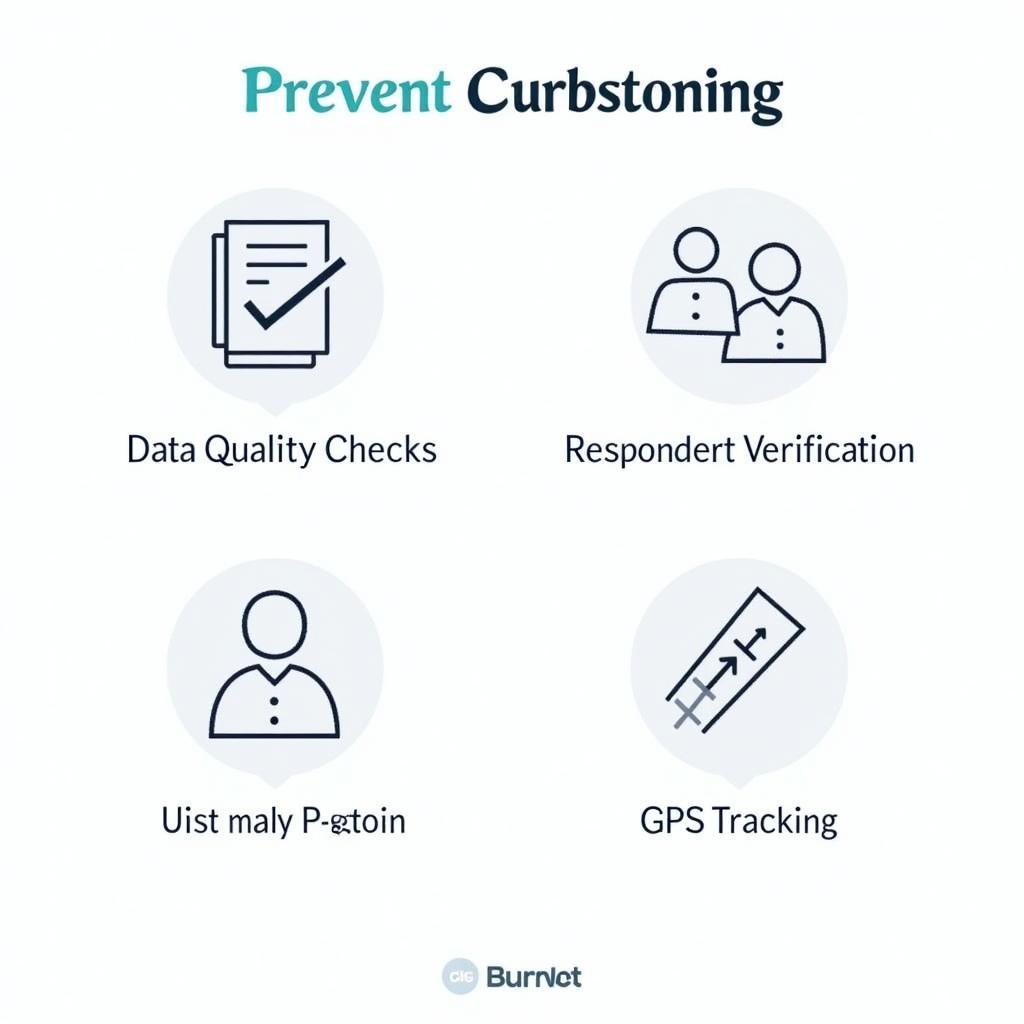In the context of marketing research, curbstoning occurs when a researcher fabricates data instead of actually collecting it from respondents. This deceitful practice undermines the integrity of market research and can lead to disastrous consequences for businesses relying on the tainted data. Let’s explore this unethical behavior and its implications.
Understanding Curbstoning in Market Research
Curbstoning, also known as rocking-chair interviewing or drive-by interviewing, essentially involves faking data collection. Instead of conducting genuine interviews or surveys, the researcher invents responses, often completing questionnaires themselves while sitting in their car or at home, hence the term “curbstoning.” This practice stems from various factors, including pressure to meet deadlines, difficulty reaching respondents, or simply a lack of ethical standards. The ramifications, however, can be severe.
Why is Curbstoning Considered Unethical?
Curbstoning violates the fundamental principles of market research, which relies on accurate and unbiased data. It introduces false information into the data pool, skewing results and leading to flawed conclusions. This can mislead businesses into making poor decisions based on fabricated insights. Moreover, it damages the credibility of the researcher and the research firm involved.
How Does Curbstoning Affect Businesses?
The impact of curbstoning can be devastating for businesses. Imagine launching a new product based on market research that suggests high demand, only to discover that the supposed demand was entirely fabricated. The financial losses can be substantial, and the damage to the brand’s reputation can be long-lasting.
 Curbstoning Impact on Business Decisions
Curbstoning Impact on Business Decisions
Identifying and Preventing Curbstoning
Detecting curbstoning can be challenging, but several methods can help mitigate the risk:
- Data Quality Checks: Implementing rigorous quality control procedures, including data validation and verification, can help identify inconsistencies and potential fabrications.
- Respondent Verification: Contacting a subset of respondents to confirm their participation and verify the accuracy of their recorded responses is a crucial step.
- Interviewer Training and Supervision: Providing thorough training to interviewers on ethical research practices and closely supervising their work can deter curbstoning.
- GPS Tracking (For Field Interviews): Utilizing GPS tracking for field interviewers can verify their location and ensure they are actually conducting interviews at the designated locations.
 Strategies to Prevent Curbstoning in Market Research
Strategies to Prevent Curbstoning in Market Research
What are the Long-Term Consequences of Curbstoning?
The long-term consequences of curbstoning extend beyond individual projects. It can erode trust in the market research industry as a whole, making businesses hesitant to invest in research and potentially hindering innovation.
“Curbstoning is a cancer to the market research industry,” says Dr. Amelia Carter, a leading expert in research ethics. “It undermines the very foundation of our work, which is to provide accurate and reliable insights. We must be vigilant in our efforts to prevent it.”
In the Context of Marketing Research, Curbstoning Occurs When…Data Integrity is Compromised
When researchers resort to curbstoning, they compromise the very essence of data integrity. The fabricated data not only misrepresents reality but also distorts the decision-making process. Businesses that rely on such data are essentially navigating blindfolded, making choices based on illusions rather than facts.
How can Businesses Choose Ethical Research Partners?
Choosing ethical research partners is paramount to avoiding curbstoning and ensuring data integrity. Businesses should look for research firms that:
- Emphasize transparency and ethical practices: A reputable firm will openly communicate its research methodologies and demonstrate a commitment to ethical standards.
- Have robust quality control measures: Look for firms that have established procedures for data validation, verification, and interviewer training.
- Are members of professional market research organizations: Membership in organizations like the Insights Association or ESOMAR signifies adherence to a code of ethics.
 Selecting Ethical Research Partners for Businesses
Selecting Ethical Research Partners for Businesses
“Transparency and accountability are key,” adds Dr. Michael Stevens, a seasoned market research consultant. “Businesses should ask tough questions about data collection procedures and quality control measures before engaging with a research firm.”
Conclusion: Protecting the Integrity of Market Research
In the context of marketing research, curbstoning occurs when data is fabricated, a practice that has severe ethical and practical implications. By understanding the nature of curbstoning, its consequences, and the methods to prevent it, businesses can protect themselves from flawed data and ensure the integrity of their market research initiatives. By demanding transparency and accountability from research partners, we can collectively uphold the value and trustworthiness of the insights that drive business decisions.
FAQ
- What is the simplest definition of curbstoning? Fabricating data instead of collecting it from respondents.
- Why is curbstoning a problem? It leads to inaccurate results and poor business decisions.
- How can businesses detect curbstoning? Through data quality checks and respondent verification.
- What are the long-term effects of curbstoning? Erosion of trust in the market research industry.
- How can businesses avoid curbstoning? By partnering with ethical research firms.
- What are some signs of an ethical research firm? Transparency, robust quality control, and professional memberships.
- What should businesses ask potential research partners? Questions about data collection and quality control procedures.
Common Curbstoning Scenarios
- A researcher faces a tight deadline and fabricates data to finish the project on time.
- An interviewer struggles to reach respondents in a remote area and invents responses.
- A researcher feels pressured to deliver specific results and manipulates the data accordingly.
Related Articles
- Data Quality in Market Research
- Ethical Considerations in Market Research
- Choosing the Right Market Research Partner
Need support? Contact us 24/7: Phone: 0904826292, Email: research@gmail.com, or visit us at No. 31, Alley 142/7, P. Phú Viên, Bồ Đề, Long Biên, Hà Nội, Việt Nam.